企业全球化(英语中文对照)
- 格式:docx
- 大小:15.59 KB
- 文档页数:3
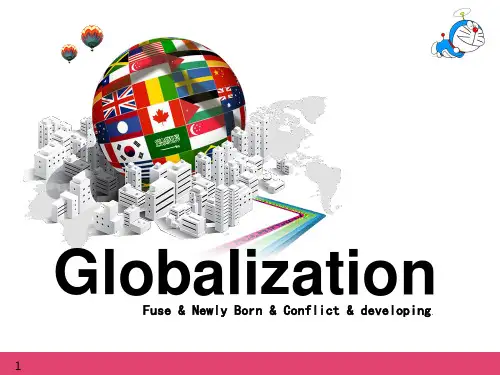
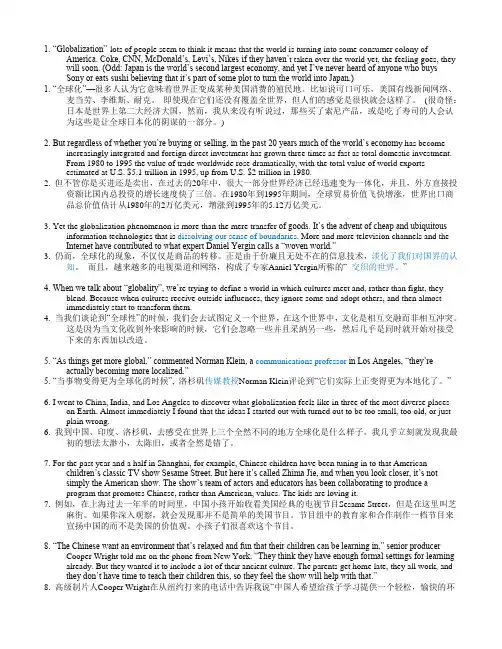
1. “Globalization”-lots of people seem to think it means that the world is turning into some consumer colony ofAmerica. Coke, CNN, McDonald’s, Levi’s, Nikes-if they haven’t taken over the world yet, the feeling goes, they will soon. (Odd: Japan is the world’s second largest economy, and yet I’ve never heard of anyone who buysSony or eats sushi believing that it’s part of some plot to turn the world into Japan.)1. “全球化”—很多人认为它意味着世界正变成某种美国消费的殖民地。
比如说可口可乐,美国有线新闻网络、麦当劳、李维斯、耐克。
即使现在它们还没有覆盖全世界,但人们的感觉是很快就会这样了。
(很奇怪:日本是世界上第二大经济大国,然而,我从来没有听说过,那些买了索尼产品,或是吃了寿司的人会认为这些是让全球日本化的阴谋的一部分。
)2. But regardless of whether you’re buying or selling, in the past 20 years much of the world’s econom y has becomeincreasingly integrated and foreign direct investment has grown three times as fast as total domestic investment.From 1980 to 1995 the value of trade worldwide rose dramatically, with the total value of world exportsestimated at U.S. $5.1 trillion in 1995, up from U.S. $2 trillion in 1980.2. 但不管你是买进还是卖出,在过去的20年中,很大一部分世界经济已经迅速变为一体化,并且,外方直接投资额比国内总投资的增长速度快了三倍。

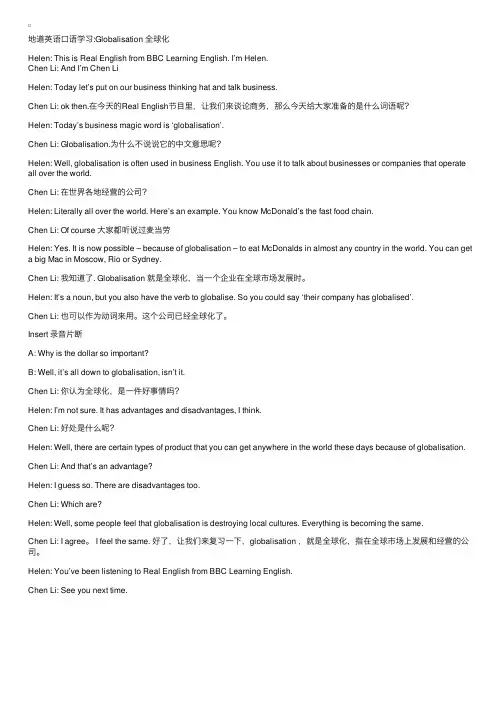
地道英语⼝语学习:Globalisation 全球化Helen: This is Real English from BBC Learning English. I’m Helen.Chen Li: And I’m Chen LiHelen: Today let’s put on our business thinking hat and talk business.Chen Li: ok then.在今天的Real English节⽬⾥,让我们来谈论商务,那么今天给⼤家准备的是什么词语呢?Helen: Today’s business magic word is ‘globalisation’.Chen Li: Globalisation.为什么不说说它的中⽂意思呢?Helen: Well, globalisation is often used in business English. You use it to talk about businesses or companies that operate all over the world.Chen Li: 在世界各地经营的公司?Helen: Literally all over the world. Here’s an example. You know McDonald’s the fast food chain.Chen Li: Of course ⼤家都听说过麦当劳Helen: Yes. It is now possible – because of globalisation – to eat McDonalds in almost any country in the world. You can get a big Mac in Moscow, Rio or Sydney.Chen Li: 我知道了. Globalisation 就是全球化,当⼀个企业在全球市场发展时。
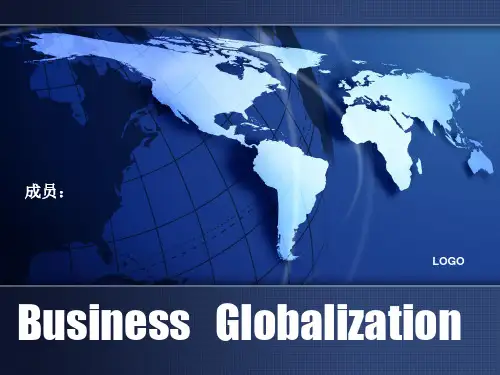
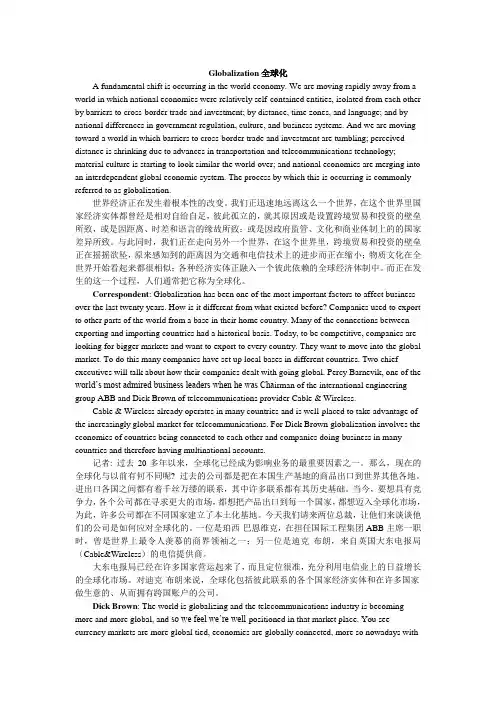
Globalization 全球化A fundamental shift is occurring in the world economy. We are moving rapidly away from a world in which national economies were relatively self-contained entities, isolated from each other by barriers to cross-border trade and investment; by distance, time zones, and language; and by national differences in government regulation, culture, and business systems. And we are moving toward a world in which barriers to cross-border trade and investment are tumbling; perceived distance is shrinking due to advances in transportation and telecommunications technology; material culture is starting to look similar the world over; and national economies are merging into an interdependent global economic system. The process by which this is occurring is commonly referred to as globalization.世界经济正在发生着根本性的改变。
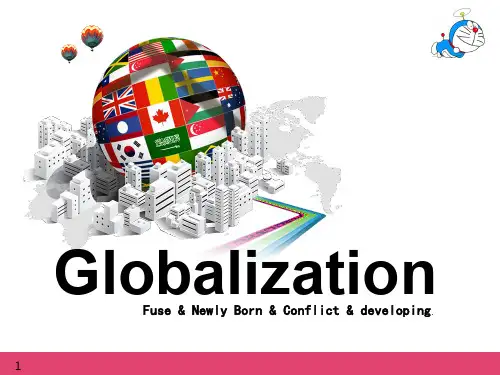
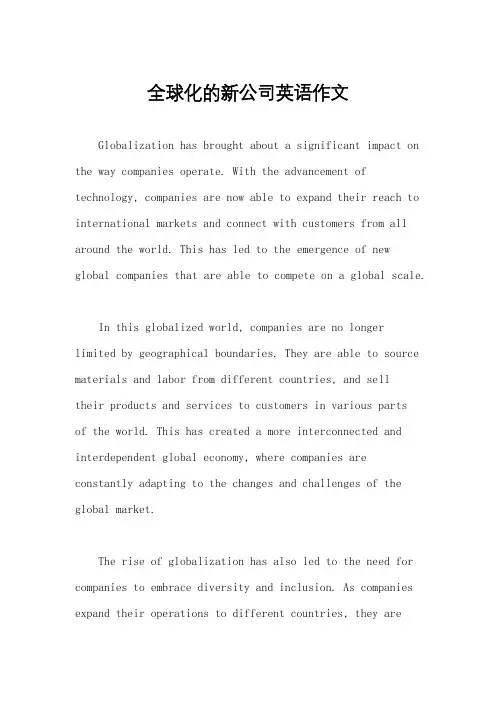
全球化的新公司英语作文Globalization has brought about a significant impact on the way companies operate. With the advancement of technology, companies are now able to expand their reach to international markets and connect with customers from all around the world. This has led to the emergence of newglobal companies that are able to compete on a global scale.In this globalized world, companies are no longerlimited by geographical boundaries. They are able to source materials and labor from different countries, and selltheir products and services to customers in various partsof the world. This has created a more interconnected and interdependent global economy, where companies areconstantly adapting to the changes and challenges of the global market.The rise of globalization has also led to the need for companies to embrace diversity and inclusion. As companies expand their operations to different countries, they areexposed to different cultures, languages, and ways of doing business. This has forced companies to become more open-minded and inclusive in order to effectively navigate the complexities of the global market.Furthermore, globalization has also brought about new opportunities for collaboration and partnership among companies. With the ease of communication and transportation, companies are now able to form strategic alliances with other companies from different parts of the world. This has allowed companies to access new markets, share resources, and leverage each other's strengths to achieve mutual success.In conclusion, globalization has transformed the way companies operate and compete in the global market. It has created new opportunities for companies to expand their reach, embrace diversity, and collaborate with other companies on a global scale. As the world continues to become more interconnected, it is crucial for companies to adapt to the changes and challenges of the global market in order to thrive in this new era of globalization.。
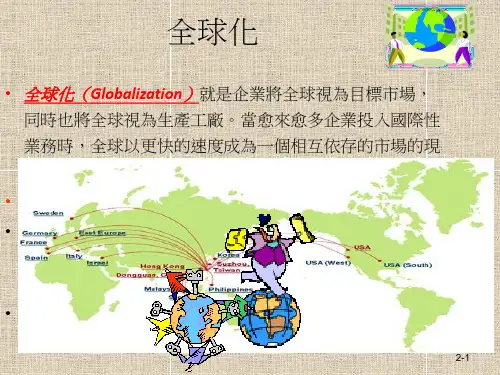
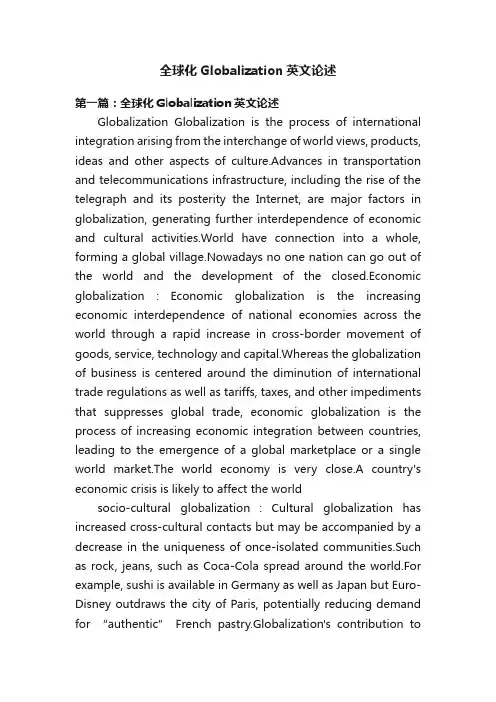
全球化Globalization英文论述第一篇:全球化Globalization英文论述Globalization Globalization is the process of international integration arising from the interchange of world views, products, ideas and other aspects of culture.Advances in transportation and telecommunications infrastructure, including the rise of the telegraph and its posterity the Internet, are major factors in globalization, generating further interdependence of economic and cultural activities.World have connection into a whole, forming a global village.Nowadays no one nation can go out of the world and the development of the closed.Economic globalization:Economic globalization is the increasing economic interdependence of national economies across the world through a rapid increase in cross-border movement of goods, service, technology and capital.Whereas the globalization of business is centered around the diminution of international trade regulations as well as tariffs, taxes, and other impediments that suppresses global trade, economic globalization is the process of increasing economic integration between countries, leading to the emergence of a global marketplace or a single world market.The world economy is very close.A country's economic crisis is likely to affect the worldsocio-cultural globalization:Cultural globalization has increased cross-cultural contacts but may be accompanied by a decrease in the uniqueness of once-isolated communities.Such as rock, jeans, such as Coca-Cola spread around the world.For example, sushi is available in Germany as well as Japan but Euro-Disney outdraws the city of Paris, potentially reducing demand for “authentic” French pastry.Globalization's contribution tothe alienation of individuals from their traditions may be modest compared to the impact of modernity itself.Globalization has expanded recreational opportunities by spreading pop culture, particularly via the Internet and satellite television.the Internet connects computer users around the world.From 2000 to 2009, the number of Internet users globally rose from 394 million to 1.858 billion.By 2010, 22 percent of the world's population had access to computers with 1 billion Google searches every day, 300 million Internet users reading blogs, and 2 billion videos viewed daily on YouTube.The example of globalization:AIRBUS,ADIDAS.Globalization has a lot of good or bad influence to us.First talk about the positive: worldwide the number of common standards;the growth of international trade faster than the world economic growth;the proportion of multinational companies in the world economy;the development of the global financial system;and More and more international cultural influence, such as through the export of Hollywood movies;promote the development of international tourism;a lot of information resources sharing via the Internet.The bad influence is the widening gap between the rich and poor;the increase of illegal immigrants;The expansion of terrorism;Its unemployment rate increaseThe Finally, statement about my point of view.The trend of globalization is irreversible, we should conform to this trend, we should not go against globalization.If you resist the globalization is obvious, north Korea is resist globalization, so the economy is backward, and there also very miserably of people's life.Globalization makes countries can share resources, cheap goods, technology have very convenient also, human resources also can free flow between countries, promote the prosperity ofthe national economy.At the same time, also promote the spread of cultural globalization, cultural communication is also more frequently, is conducive to the development of national culture.Although a lot of the benefits of globalization, but also should pay attention to protect our country own business brand, technology, enhance the value of the independent brand, pay attention to brand building, in this way, can we have their own advantages in the globalization.第二篇:口语情景对话:全球化 GlobalizationTodd: OK.Jamie.We're back.杰米,我们开始吧。
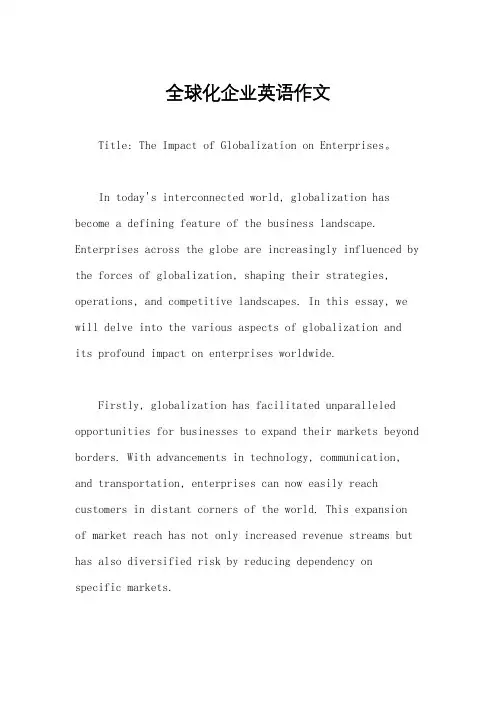
全球化企业英语作文Title: The Impact of Globalization on Enterprises。
In today's interconnected world, globalization has become a defining feature of the business landscape. Enterprises across the globe are increasingly influenced by the forces of globalization, shaping their strategies, operations, and competitive landscapes. In this essay, we will delve into the various aspects of globalization andits profound impact on enterprises worldwide.Firstly, globalization has facilitated unparalleled opportunities for businesses to expand their markets beyond borders. With advancements in technology, communication, and transportation, enterprises can now easily reach customers in distant corners of the world. This expansion of market reach has not only increased revenue streams but has also diversified risk by reducing dependency onspecific markets.Secondly, globalization has intensified competition among enterprises. As barriers to entry diminish and markets become more accessible, companies face heightened competition from both domestic and international rivals. This dynamic environment compels enterprises to constantly innovate, improve efficiency, and differentiate their offerings to stay ahead in the global marketplace.Moreover, globalization has led to the emergence of multinational enterprises (MNEs) as major players in the global economy. These corporations operate across multiple countries, leveraging their global presence to optimize production, distribution, and sourcing activities. By capitalizing on economies of scale and scope, MNEs can achieve cost efficiencies and gain a competitive edge over smaller, localized firms.Additionally, globalization has fostered the exchange of knowledge, ideas, and best practices among enterprises worldwide. Through cross-border collaborations, joint ventures, and strategic partnerships, companies can leverage the expertise and resources of diversestakeholders to drive innovation and accelerate growth. This sharing of knowledge not only benefits individual enterprises but also contributes to the overall advancement of industries and economies.Furthermore, globalization has necessitated enterprises to adapt to diverse cultural, regulatory, and economic environments. Operating in foreign markets requires companies to navigate complex geopolitical landscapes, adhere to local laws and regulations, and understand the preferences and behaviors of diverse consumer segments. Successful enterprises are those that demonstrate cultural sensitivity, adaptability, and a willingness to embrace diversity in all its forms.However, it is important to acknowledge that globalization also presents challenges and risks for enterprises. Economic volatility, geopolitical tensions, and regulatory uncertainties can disrupt global supply chains, affect market demand, and increase operational complexities for businesses. Moreover, concerns regarding environmental sustainability, social responsibility, andethical business practices have become paramount in the era of globalization, requiring enterprises to adopt responsible and sustainable business models.In conclusion, globalization has transformed the business landscape, reshaping the way enterprises operate, compete, and collaborate on a global scale. While presenting unprecedented opportunities for growth and expansion, globalization also brings forth challenges that enterprises must navigate strategically. In this dynamic environment, agile and adaptable enterprises are best positioned to thrive amidst the complexities of globalization and emerge as leaders in the global marketplace.。
公司走向全球英语作文With the rapid development of globalization, more and more companies are expanding their business to the international market. As a result, it has becomeincreasingly important for companies to have a global perspective and to be able to communicate effectively in English.In order to succeed in the global market, companiesneed to have a clear understanding of the cultural differences and business practices of different countries. They also need to be able to communicate with customers, partners, and employees in different parts of the world. English has become the international language of business, and companies that are able to communicate effectively in English have a significant advantage over their competitors.To achieve success in the global market, companies need to invest in their employees’ English language skills.This can be done through language training programs, hiringEnglish-speaking employees, and providing opportunities for employees to work in English-speaking countries. By improving their employees’ English language skills, companies can improve their communication with customersand partners, and increase their chances of success in the global market.Another important factor in a company’s success in the global market is its ability to adapt to different cultures. Companies that are able to understand and respect the cultural differences of their customers and partners are more likely to succeed in the global market. This can be achieved through cultural training programs and by hiring employees who are familiar with the culture of the target market.In conclusion, companies that are able to communicate effectively in English and adapt to different cultures are more likely to succeed in the global market. By investingin their employees’ English language skills and cultural awareness, companies can improve their chances of success and achieve their goals in the international market.。
公司全球化英文作文英文:Globalization has become an inevitable trend for companies in today's world. As a company, we have been actively exploring overseas markets and expanding our business globally. In order to achieve this, we have adopted various strategies such as establishing overseas branches, forming partnerships with local companies, and conducting market research to better understand the needs and preferences of consumers in different regions.One of the challenges we have faced in the process of globalization is the language barrier. In some countries, English is not the primary language, and it can bedifficult to communicate effectively with local employees and customers. To overcome this, we have hired language experts and provided language training to our employees. We have also developed multilingual websites and customer service systems to better serve our global customers.Another challenge is cultural differences. Different regions have different customs, traditions, and ways of doing business. For example, in some countries, it is customary to exchange gifts during business meetings, while in others, it is considered inappropriate. To adapt tothese differences, we have conducted extensive research on local cultures and customs, and have trained our employeesto be culturally sensitive and respectful.Despite the challenges, globalization has brought many benefits to our company. By expanding our business globally, we have been able to tap into new markets, increase our customer base, and diversify our revenue streams. We have also gained valuable insights into different regions and cultures, which has helped us to develop new products and services that meet the needs of our global customers.中文:全球化已成为当今世界上公司不可避免的趋势。
公司全球化英文作文英文:Globalization has become an undeniable force shaping the modern business landscape. Companies around the world are increasingly expanding their operations internationally to tap into new markets, access resources, and gain a competitive edge. As someone who has witnessed and participated in this phenomenon firsthand, I can attest to its profound impact on both businesses and individuals.One significant benefit of globalization is the access to a larger consumer base. When a company goes global, it opens up opportunities to reach customers in different countries and regions. For example, a tech company like Apple has successfully penetrated markets across the globe with its iPhones and other products. By localizing their marketing strategies and products to suit diverse cultures and preferences, they have been able to thrive in various markets.Another advantage of globalization is the potential for cost savings and efficiency gains through outsourcing and offshoring. Many companies outsource certain tasks or manufacturing processes to countries with lower labor costs, allowing them to reduce expenses and focus on their core competencies. For instance, a clothing brand may choose to manufacture its products in countries like Bangladesh or Vietnam where labor costs are lower, enabling them to offer competitive prices to consumers.Furthermore, globalization fosters innovation and knowledge exchange on a global scale. When companiesoperate in different countries, they are exposed to diverse perspectives, ideas, and technologies. This cross-pollination of knowledge often leads to breakthrough innovations and advancements in various fields. Take the automotive industry, for example, where companies like Toyota have pioneered new manufacturing techniques and sustainability practices by drawing inspiration fromdifferent cultures and markets.However, it's important to acknowledge that globalization also poses challenges and risks. One of the major concerns is the potential loss of jobs in developed countries due to outsourcing and automation. While globalization creates new opportunities for growth, it also disrupts traditional industries and livelihoods. For instance, the rise of e-commerce giants like Amazon has led to the closure of many brick-and-mortar stores, resulting in job losses for retail workers.Additionally, globalization can exacerbate income inequality both within and between countries. While some individuals and regions benefit from increased trade and investment, others may be left behind, leading to social tensions and unrest. It's crucial for policymakers and businesses to address these disparities and ensure that the benefits of globalization are shared more equitably.In conclusion, globalization is a double-edged sword that brings both opportunities and challenges for businesses and society as a whole. While it enables companies to expand their reach, reduce costs, and driveinnovation, it also raises concerns about job displacement and inequality. By embracing globalization responsibly and fostering inclusive growth, we can harness its potential to create a more prosperous and interconnected world.中文:全球化已成为塑造现代商业格局的不可否认的力量。
挑战一:全球化的管理理念如何树立?Challenge one: globalization management ideas how to set up?典型案例—中星微:A typical case: earlymiddle 星微中星微电子公司是中国企业全球化的典型企业。
1999年创立之初,就对全球芯片市场进行了充分研究,立足全球选择目标市场,最终确定了数字多媒体芯片领域作为突破口。
公司的运营采用“硅谷模式”,即把硅谷的风险投资模式和股票期权制度引入公司,并把硅谷的经营理念用于公司运营,完全按照全球化公司的标准来要求自己。
2005年底,中星微在纳斯达克上市。
In microelectronics company is a member of the Chinese enterprises'global of a typical enterprise. Founded at the beginning of 1999, on the global chip fully research the market, based on the global select target market, ultimately determine the digital multimedia as a breakthrough in the field of chip. The company's operation mode using ” “ Silicon Valley, that is, from Silicon Valley venture capital model and the introduction of the company's stock option system and Silicon Valley business philosophy, for companies operating on the basis of globalization company's standard to require their own. The end of 2005 in NASDAQ in 星微.挑战二:全球化能力如何提升?Challenge two: how to improve the ability of globalization?典型案例—华为:Typical cases of Huawei:华为采用的是全球范围内的本地化经营战略。
全球化中英文对照Globalization, for good or ill, is here to stay. But what is globalization? Globalization is an attempt to abolish barriers, especially in trade. In fact, globalization has been around longer than you might think.全球化这个概念,不仅代表了世界各地距离的“收缩”,而且代表了人们不断增强的世界一体化的意识。
这是一个用来描述如此社会变化的术语:世界范围的经济活动令跨国贸易、投资、和文化交流大大增加。
几个世纪以来,纵然有过中断,涉及到全球化这一概念的各种活动及其发展一直在进行着,但只有在相对较近的一段时期,全球化才成为一个人们讨论的焦点。
在当前,或是在刚刚过去的不久,我们所指的全球化时代实际上一直围绕着民族主义、民族国家、民族文化身份这几个概念。
我们所面对的新形式的全球化存在于一个相互联系的世界以及全球大众文化里,而这,通常又被我们称为“地球村”。
Globalization, as a concept, refers both to the "shrinking" of the world and the increased consciousness of the world as a whole. It is a term used to describe the changes in societies and the world economy that are the result of dramatically increased cross-border trade, investment, and cultural exchange. The processes and actions to which the concept of globalization now refers have been proceeding, with some interruptions, for many centuries, but only in relatively recent times has globalization become a main focus of discussion. The current or recently-past epoch of globalization has been dominated by the nation-state, national economies, and national cultural identities. The new form of globalization is an interconnected world and global mass culture, often referred to as a "global village."全球化迷思对于全球化这一概念,很多学者在争论这是一个真正的现象或者一个神话。
跨国公司中英翻译全球经济一体化Economy globalization多国企业Multinational Corporations / Enterprises国际企业International Corporations跨国公司Transnational Corporations结构标准Structural Criterion经营业绩标准Performance Characteristics Criterion行为特征标准Behavioral Characteristics Criterion跨国指数Transnationality Index民族中心型公司(Ethnocentric Corporations)多元中心型公司(Polycentric Corporations)全球中心型公司(Geocentric Corporations)跨国公司(transnational companies)早期跨国公司形成(early TNC’s Formation)过剩资本surplus of capital演进方向development direction跨国兼并transnational mergers and acquisition战略联盟strategic alliance研究与开发research and development组织结构organizational structure绿地投资Greenfield investment海默-金德尔伯格传统H-K Tradition垄断优势Monopoly Advantage产品生命周期理论Theory of Product Life Cycle寡占反应(Oligopolistic Reaction)内部化Internalization区位理论Location Theory全球区位理论(Global Location Theory)边际产业扩张(Marginal Industry Expansion)折衷理论(Eclectic Theory)战略优势(Strategic Advantages)跨国经营环境international environment差异性difference国际经济环境international economic environment国际文化环境international cultural environment个人主义Individualism集体主义Collectivism权利距离Power distance不确定性回避Uncertainty avoidance自我参考价值self-value criteria国际政治法律环境international political and lawyer environment 国际自然环境international natural environment国际市场的进入方式Entry mode of international market影响因素Influence factors贸易式进入Export trade契约式进入Contract trade直接投资Direct investment直接出口Direct export间接出口Direct export跨国公司全球战略(Global Strategy of Transnationnl CorporaLion) 业务流程重组(Business Process Reengineering, BPR)跨国公司战略联盟(Strategic Alliance of Transnational Corporation)国际战略联盟(International Strategic Alliance)并购(或购并)( Merger and Acquisition, M&A)横向并购(Horizontal Merger)纵向并购(Vertical Merger)混合并购(Conglomerate Merger)接管兼并(Take-Over)强制并购( Mandatory Merger)公开收购要约(Tender Offer)杠杆收购(Leveraged Buy-out)研究开发R&D Research and Development基础性研究Basic or Fundamental Research应用性研究Applied Research试验性开发Development Research专利patent研发战略联盟R&D Strategic Alliance技术标准Technology Standard标准战略Standard Strategy竞争优势Competitive Advantage技术战略Strategy of Technology技术联盟战略Strategy of Technological Alliance技术转移Technology Transfer竞争战略Competition Strategy技术创新Technogical Innovation核心技术Core Technology市场营销组合marketing mix本土化localization全球化globalization全球本土化global localization品牌资产Brand Equity原产地效应country-of-origin effects价格升级price escalation灰市交易gray market倾销dumping卖点主张Unique Selling Proposition母国(Parent Country)东道国(Host Country)监管(Supervision)海外投资保险(Overseas Investment Insurance)外汇风险(Foreign Exchange Risk)征用险(Expropriation)战争、革命、内乱险(War,Revolution,Insurrection)经济合作与发展组织(Organization for Economic Cooperation and Development,OECD)与贸易有关的投资措施协议(Agreement on Trade-related Investment Measures,简称TRIM s)重点:十一章的:组织管理:Organizational Management母公司:Parent Company分公司:Subsidiary Company子公司:Branch Company组织结构:Organizational StructureU型结构:Unitary StructureH型结构:Holding StructureM型结构:Multi-divisional Structure学习型组织:Learning Organization虚拟组织:Virtual Organization跨国人力资源管理:Multinational Human Resource Management跨文化管理:Multi-culture Management。
挑战一:全球化的管理理念如何树立?Challenge one: globalization management ideas how to set up?典型案例—中星微:A typical case: earlymiddle 星微中星微电子公司是中国企业全球化的典型企业。
1999年创立之初,就对全球芯片市场进行了充分研究,立足全球选择目标市场,最终确定了数字多媒体芯片领域作为突破口。
公司的运营采用“硅谷模式”,即把硅谷的风险投资模式和股票期权制度引入公司,并把硅谷的经营理念用于公司运营,完全按照全球化公司的标准来要求自己。
2005年底,中星微在纳斯达克上市。
In microelectronics company is a member of the Chinese enterprises'global of a typical enterprise. Founded at the beginning of 1999, on the global chip fully research the market, based on the global select target market, ultimately determine the digital multimedia as a breakthrough in the field of chip. The company's operation mode using ” “ Silicon Valley, that is, from Silicon Valley venture capital model and the introduction of the company's stock option system and Silicon Valley business philosophy, for companies operating on the basis of globalization company's standard to require their own. The end of 2005 in NASDAQ in 星微.挑战二:全球化能力如何提升?Challenge two: how to improve the ability of globalization?典型案例—华为:Typical cases of Huawei:华为采用的是全球范围内的本地化经营战略。
为了更加贴近客户,倾听客户需求并快速响应,华为在海外设立了20个地区部,100多个分支机构。
华为还在美国、印度、瑞典、俄罗斯等地设立了12个研发中心,每个研发中心的研究侧重点及方向不同,聚集全球的技术、经验和人才来进行产品研究开发,使产品一上市,技术就与全球同步。
华为还在海外设立了28个区域培训中心,为当地培养技术人员,并大力推行员工的本地化。
Huawei is a worldwide localization business strategy. In order to get closer to their customers, listening to your customers ' needs and respond quickly, overseasfor, .hk/tb_chest 20, more than 100 countries. Huawei is also in the United States, India, Sweden, Russia, and by 12 research and Development Center, each of which research and development center of the differences in priorities and direction,clustered around the world technology, experience and talent for product research and development, a listing of their product, technology and global synchronization. Huawei also overseas 28 Regional Centre for training, technical staff for the local culture, and strongly the implementation of the employee's localization.挑战三:全球化的人才队伍如何打造?Challenge three: globalization team how to build up?典型案例—趋势科技:In typical cases — trend micro:趋势科技成立于1988年,目前已是全球领先的防毒软件公司,在全球建有30家分公司。
Trend micro was founded in 1988, is already the world's leading anti-virus software companies around the world to build 30 branches.它采用多总部运作模式,不以任何国家为统领—财务中心在日本,营销中心在美国,研发大本营在台湾,全球客户服务中心在菲律宾,行政中心在爱尔兰。
它有一支优秀的跨国管理团队,仅有13人的核心管理团队来自中国、日本、印度、美国、德国、阿根廷等6个国家。
它有凝聚多元化的强势文化,企业的核心价值观符合人性,放之全球而皆准。
It polybromide headquarters operations, no countries under the guidance of Finance Center in Japan, maralwexi in the United States, research and development base camp in Taiwan, global customer service center in the Philippines, the administrative centre in Ireland. It has an excellent multinational management team, only 13 of the core management team from China, Japan, India, the United States, Germany, 6 countries such as Argentina. It has coacervate a wide range of powerful culture, an enterprise's core values of the human world and put them on.挑战四:创新能力如何提升?Challenge four: how to promote innovation capacity?典型案例—3M公司:In typical cases — 3 m company:3M公司以为员工提供创新环境而著称,视革新为企业成长的方式,视新产品为生命。
3M每年要开发200多种新产品,其目标是每年销售量的30%从前4年研制的新产品中获得。
3M创新管理的秘诀之一,就是努力创造一个有助于创新的内部环境。
譬如允许所有员工可使用最多15%的时间在他们感兴趣的专业上,并允许失败,它的口号是:你只有在吻过许多青蛙后,才能找到一位王子。
The 3 m company thought that the provision of a creative environment, innovation may be famousfor as a enterprises'pullulating way, depending on the new product to life. The 3 m every year more than 200 new product development, the goal is an annual sales volume of 30 per cent in the past four years in the development of new products. 3 m innovation management of one of the secrets, that is, efforts to create a conducive to innovation in the internal environment. For example, to allow all employees can use up to 15% of the time they are interested in professional and allows fails, it's slogan is: you kissed a lot of frogs, to find a Prince.挑战五:如何利用战略合作抓住全球化过程中的机遇?Challenge five: how to take advantage of strategic cooperation in the process of globalization to seize the opportunities?典型案例—海尔:A typical case: duhayr:2002年,海尔与台湾最大的家电制造商台湾声宝集团结成同业联盟,双方的合作涵盖互相销售对方的家电产品,并扩大了零组件采购及技术共享。
与声宝的结盟,为海尔进入台湾市场铺平了道路。
In 2002, Haier and Taiwan's largest household appliance manufacturers in Taiwan Sampo enter cartel collaboration covers mutual sales each other's home appliances and scaledup parts procurement and technology sharing. And the Alliance, and Sampo is duhayr into the Taiwan market paved the way.。